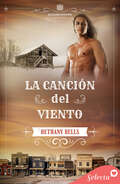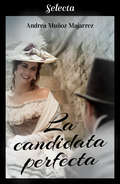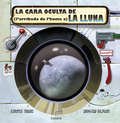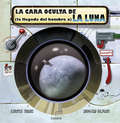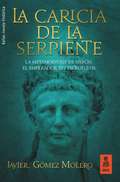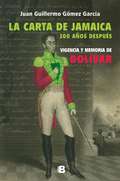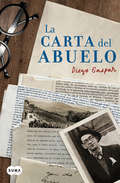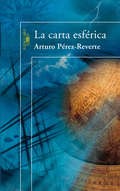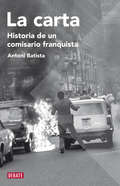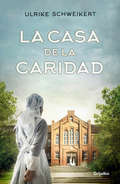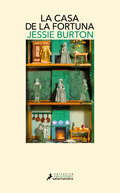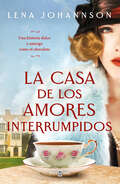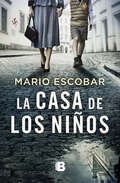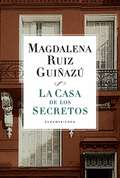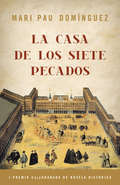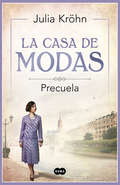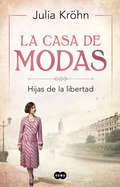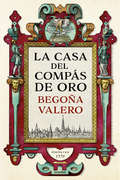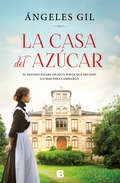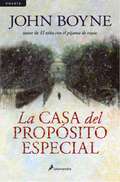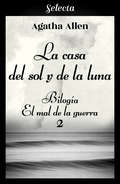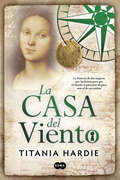- Table View
- List View
La canción del viento (Serie Elizabethtown #Volumen 6)
by Bethany Bells¿Podrá el amor verdadero superar las fronteras de la raza, y los rencores de una guerra genocida? Fiona Kelly echa de menos las verdes colinas de Irlanda, pero sabe que su futuro está en América, donde ha conseguido un buen trabajo de maestra en una pequeña localidad de Kansas llamada Elizabethtown. Pero, para su desdicha, de camino hacia allí tiene que enfrentarse a un grupo de bandidos, entre los que hay un salvaje de ojos azules que dará un vuelco total a su vida. John Lobo Azul Walls «Wahaya» es un hombre que camina entre dos realidades muy distintas. Los rasgos de su rostro y el tono de su piel lo definen como Cherokee, pero sus ojos azules le delatan como bastardo del pueblo invasor. Las mujeres nunca han sido una prioridad en su vida y, desde luego, sabe que fijarse en una blanca es sinónimo de buscar el desastre, de modo que procura mantenerse muy lejos de ellas. Una empresa difícilcuando se topa con esa pelirroja llena de fuerza que tanta admiración le suscita.
La candidata perfecta
by Andrea Muñoz MajarrezUna apasionante y romántica historia ambientada en la época victoriana que apasionará a los lectores de mano de Andrea Muñoz Majarrez. Henry Crawford busca a la mujer de sus sueños, pero no le resultará nada fácil encontrarla. Henry Crawford, uno de los solteros más codiciados de Inglaterra, decide que ya es hora de sentar cabeza, casarse y formar una familia. En una fiesta de la temporada se reencuentra con una vieja conocida, lady Audrey Morgan, hija de los marqueses de Clayton. Audrey es una joven de veintiséis años, considerada ya una solterona, con un don especial: Es una excelente casamentera. Henry, sabedor de este detalle, decide pedirle ayuda para encontrar a su futura esposa. Audrey no duda en ayudarle, y se pone manos a la obra. Pronto encontrará a la mujer ideal para Henry. Se trata de la joven lady Victoria Baltimore, una muchacha de buena familia, bella y educada. Aunque parece que ha hallado a la candidata perfecta, Henry no está del todo convencido, porque apenas tiene cosas en común con la joven lady Victoria. Sin embargo, pronto se dará cuenta de que quien realmente le atrae es Audrey, con quien poco a poco va forjando una amistad muy especial. Esto provocará que Henry empiece a albergar dudas en su corazón. ¿Conseguirá Henry aclarar sus sentimientos? ¿Encontrará a la mujer de sus sueños?
La candidata perfecta
by Andrea Muñoz MajarrezUna apasionante y romántica historia ambientada en la época victoriana que apasionará a los lectores de mano de Andrea Muñoz Majarrez. Henry Crawford busca a la mujer de sus sueños, pero no le resultará nada fácil encontrarla. Henry Crawford, uno de los solteros más codiciados de Inglaterra, decide que ya es hora de sentar cabeza, casarse y formar una familia. En una fiesta de la temporada se reencuentra con una vieja conocida, lady Audrey Morgan, hija de los marqueses de Clayton. Audrey es una joven de veintiséis años, considerada ya una solterona, con un don especial: Es una excelente casamentera. Henry, sabedor de este detalle, decide pedirle ayuda para encontrar a su futura esposa. Audrey no duda en ayudarle, y se pone manos a la obra. Pronto encontrará a la mujer ideal para Henry. Se trata de la joven lady Victoria Baltimore, una muchacha de buena familia, bella y educada. Aunque parece que ha hallado a la candidata perfecta, Henry no está del todo convencido, porque apenas tiene cosas en común con la joven lady Victoria. Sin embargo, pronto se dará cuenta de que quien realmente le atrae es Audrey, con quien poco a poco va forjando una amistad muy especial. Esto provocará que Henry empiece a albergar dudas en su corazón. ¿Conseguirá Henry aclarar sus sentimientos? ¿Encontrará a la mujer de sus sueños?
La canzone del faro
by Barbara SchinkoUn faro in Irlanda. Tre giovani donne. Tre storie d'amore che si uniscono per formare una grande canzone d'amore: LA CANZONE DEL FARO. Un faro chiamato "canzone d'amore": per generazioni, tre giovani donne combattono per il loro amore su Amhrán Grá al largo della costa sud-occidentale dell'Irlanda. Alvy, la prima guardiana del faro e amante del bucaniere Macallis. Goldstar, la naufraga. E Bee, la nipote di Goldstar, che, come violinista dotata, voleva solo prendersi una pausa per ritrovare di nuovo la musica. Ma la conoscenza con il misterioso Owen Macallis assicurerà che il loro destino sarà unito alle canzoni d'amore del passato.
La cara oculta de (l'arribada de l'home a) la Lluna
by Lewis York Roger OlmosAmb motiu del 40 aniversari de l'arribada de l'home a la lluna, Lumen visita el món llunàtic. Al final de la Segona Guerra Mundial (1945) les dues potències més poderoses de l'època, l'URSS i els EEUU, iniciaren el que s'anomenà la Guerra Freda. Una de les disputes més espectaculars fou la carrera de l'espai. Tant els comunistes com els capitalistes volien conquerir l'espai exterior, o si més no que ho semblés. L'URSS anava per davant amb els seus proyectes Sputnik, però els EEUU aconseguiren guanyar la partida més important: que un home trepitgés la Lluna. El 20 de juliol de 1969, a les 10:56 PM, Neil Amstrong posà un peu a la Lluna i davant una audiència televisiva de 600 milions de persones, sentencià: «Aquest és un petit pas per a l'home, però un salt gegantesc per a la Humanitat». Des d'aleshores, són moltes les veus que han dubtat de la proesa exposant una sèrie d'anomalies que surten a les imatges que es feren: ombres estranyes, reflexos, un firmament sense estrelles, un allunatge que no aixeca pols... Els autors d'aquest llibre han investigat el cas i han aconseguit parlar amb alguns testimonis (vinguts des del més recòndit de la seva imaginació) que podran oferir una mica de llum sobre tants enigmes... o no. Perquè, per molt que la Lluna giri, sempre manté una cara oculta. I, en aquest cas, resulta divertida, sorprenent i rigorosament incerta.
La cara oculta de (la llegada del hombre a) la Luna
by Lewis York Roger OlmosCon motivo del aniversario de la llegada del hombre a la luna, Lumen visita el mundo lunático. Al término de la Segunda Guerra Mundial (1945) las dos potencias más poderosas de la época, la URSS y los EEUU, iniciaron lo que se denominó la Guerra Fría. Una de las disputas más espectaculares fue la carrera del espacio. Tanto los comunistas como los capitalistas querían conquistar el espacio exterior, o que lo pareciese. La URSS iba por delante con sus proyectos Sputnik, pero los EEUU consiguieron ganar la partida más importante: que un hombre pisase la Luna.El 20 de julio del 1969, a les 10:56 PM, Neil Amstrong puso un pie en la Luna y ante una audiencia televisiva de 600 millones de personas, sentenció: «Este es un pequeño paso para el hombre, pero un salto gigantesco para la Humanidad». Desde entonces, son muchas las voces que han dudado de la proeza exponiendo una serie de anomalías que aparecen en las imágenes que se tomaron: extrañas sombras, reflejos, un firmamento sin estrellas, un alunizaje que no levanto polvo...Los autores de este libro han investigado el caso y han conseguido hablar con algunos testimonios (llegados desde lo más recóndito de su imaginación) que podrán ofrecer algo de luz sobre tantos enigmas... o no. Porqué por mucho que la Luna gire, siempre mantiene una cara oculta. Y, en este caso, resulta divertida, sorprendente y rigurosamente incierta.
La cara oculta de Eva: La mujer en los países árabes
by Nawal El Saadawi«La cara oculta de Eva», un clásico de la literatura árabe moderna, denuncia la opresión que sufren las mujeres en el mundo islámico y, con unos nuevos prólogo y epílogo, mantiene toda su vigencia más de veinticinco años después de su publicación. Nawal El Saadawi relata de manera impactante la violencia y la injusticia que se han extendido por la sociedad en la que vive. Su experiencia como médico rural en distintas zonas de Egipto, como testigo de la prostitución, de los asesinatos por razones de honor y de los abusos sexuales, además de la ablación, que ella misma sufrió de niña, la impulsaron a dar testimonio de todo este sufrimiento. Con claridad y precisión detecta y analiza las causas de esta situación, y describe el papel histórico de la mujer árabe en la religión y la literatura. Para la autora, el velo, la poligamia y la falta de igualdad ante la ley de hombres y mujeres son incompatibles con el islam y con cualquiera de las otras religiones.
La caricia de la serpiente: La metamorfosis de Nerón, el emperador sin escrúpulos
by Javier Gómez MoleroCon rigor histórico y un humor contagioso evocamos la atmósfera de la Roma del siglo I mediante sucesos y personajes dispuestos a enfangarse en el lodazal de las calles y a matar o amar al abrigo del mármol y del oro de las mansiones. Un trágico suceso enfrentará a dos jóvenes amigos de origen humilde a situaciones para las que no están preparados y que pueden cambiar la historia de Roma. Mientras, en palacio, Agripina, sobrina del emperador Claudio, pone en liza sus encantos y su desvergüenza a fin de acercarse al poder que tanto ansía. Corrupción, traiciones, brujería, superstición, adulterios, envenenamientos, asesinatos, pero también combates de gladiadores, banquetes gloriosos, visitas a tugurios, reflexiones profundas y picantes conversaciones en las letrinas públicas se suceden como teselas de un mosaico que muestra la realidad de un tiempo convulso en el que nada es lo que parece. Como marco que lo encuadra y lo sostiene, una amistad inquebrantable a la que solo la muerte puede poner fin.
La carta de Jamaica
by Juan Guillermo Gomez GarciaUno de las cartas más importantes de Simón Bolívar. El seis de septiembre de 1815 Simón Bolívar escribe en Kingston la llamada Carta de Jamaica, piedra angular del pensamiento político y constitucional de la Independencia de las colonias españolas en América. Calificada también como #Carta profética#, se puede considerar la Charta Magna de la nacionalidad político-constitucional de los países libertados por sus ejércitos, de Venezuela a Bolivia. Sus visionarias y sobrias páginas justifican no solo el derecho de los pueblos latinoamericanos para la rebelión anti-imperialista, sino traza las tareas más urgentes para consolidar nuestra independencia política y cultural.
La carta del abuelo
by Diego GasparDos hermanos gemelos con una profunda capacidad para comunicarse sin palabras. Una carta fragmentada en tres folios que los conduce a una aventura familiar, a la entraña de un misterio de dolor y anhelo de supervivencia. Un viaje que les hace experimentar y desvelar algunos de los grandes secretos de la filiación. El verano más inolvidable de sus vidas. Cuando la madre de Julia y Diego les revela la existencia de una carta de su bisabuelo que contiene el mensaje escrito a su familia poco antes de ser fusilado, durante la Guerra Civil Española, los hermanos deciden ir en su busca, hasta encontrarla. La lectura de la carta los lleva a emprender un viaje para imitar la senda del bisabuelo durante sus últimos días, su aprehensión en París y su posterior entrega al ejército español. Al retrazar sus pasos encuentran pistas asombrosas sobre su vida y los folios restantes para completar el rompecabezas familiar. A lo largo de esta travesía los lazos se estrechan en maneras que nunca imaginaron. Más allá de descubrir a un hombre extraordinario en la figura de su bisabuelo, los hermanos se encuentran con ellos mismos, revelan los lugares más recónditos de su alma y aprenden a reconciliarse con su historia y entramado familiar.
La carta esférica
by Arturo Pérez-ReverteUn marino sin barco, desterrado del mar, conoce a una extraña mujer que posee, tal vez sin saberlo, respuestas a preguntas que ciertos hombres se hacen desde siglos Cazadores de naufragios en busca del fantasma de un barco perdido en el Mediterráneo, problemas de latitud y longitud cuyo secreto yace oculto en antiguos derroteros y cartas náuticas, museos navales, bibliotecas... Nunca el mar y la Historia, la ciencia de la navegación, la aventura y el misterio se habían combinado de un modo tan extraordinario en una novela, como en La carta esférica. De Melville a Stevenson y Conrad, de Homero a Patrick O'Brian, toda la gran literatura escrita sobre el mar late en las páginas de esta historia fascinante e inolvidable. La novela fue llevada al cine por Imanol Uribe y protagonizada por Carmelo Gómez y Aitana Sánchez Gijón. La crítica ha dicho...«Novelón. La carta esférica es un best seller endiabladamente entretenido, tan bien engranado como El nombre de la rosa y tan sugerente y embrujador como El perfume... Irresistible thriller marinero.»Carles Barba, La Vanguardia «Una brillante historia de aventuras: intriga romántica para todos los fans del thriller intelectual.»The Times «Atrapa... Pérez-Reverte sabe cómo y cuándo entretejer escenas; cómo y cuándo modular la emoción de la historia.»The Daily Telegraph «Oculta bajo la fórmula de un thriller marítimo, La carta esférica es una mirada reflexiva sobre la narrativa, la novela de género y la literatura en general... Una novela seductora y hermosa... Excepcional.»New York Magazine «El relato es apasionante, está perfectamente documentado, es rico en suspense y golpes de efecto. Rinde homenaje a Conrad, Melville, Homero en lo que se refiere a su dimensión marítima más sugestiva y poética.»Il Messaggero «Una gran novela marítima. Un himnoa la aventura y a la literatura.»L´Express «La carta esférica hace soplar una vez más y de forma maravillosa el viento de alta mar.»Le Monde «Su don para el relato y esa erudición náutica que el mismo O'Brian hubiera envidiado.»Le Figaro Magazine
La carta. Historia de un comisario franquista
by Antoni BatistaEl comisario Joan Creix fue durante muchos años el terror de la disidencia democrática en Barcelona. Su dura experiencia en la Guerra Civil lo convirtió en un convencido franquista y azote de los opositores al régimen. En San Sebastián fue tan brutal como efectivo, en su lucha contra la incipiente ETA. De allí pasó a Sevilla, y fue reconocido como uno de los mejores servidores del régimen. Con la llegada de la Transición se vio expedientado y relegado a sellar pasaportes en La Jonquera. Hundido y perplejo, le escribe al entonces ministro del Interior pidiéndole explicaciones por su situación actual. Un lamento a través del cual se ve una perspectiva fascinante y grotesca de nuestra historia reciente.
La casa de la caridad
by Ulrike SchweikertBerlín, 1831. El cólera ha llegado a la ciudad. Los destinos de tres mujeres se cruzarán en la Charité, el hospital más antiguo de Berlín. El pánico se apodera de Berlín cuando se descubre el cadáver de un marinero víctima del cólera. Mientras el doctor Dieffenbach y sus colegas de la Charité luchan sin tregua para frenar la epidemia, tres mujeres muy distintas verán sus destinos unidos por el hospital más avanzado de Europa en la época. Mientras los médicos de la Charité intentan descubrir el origen y la forma de trasmisión del cólera, luchan contra las infecciones, la gangrena, la tiña o la sífilis, tres mujeres valientes y luchadoras viven inmersas en sus propias batallas personales. La condesa Ludovica, atrapada en un matrimonio sin amor con un hipocondríaco. Martha, una comadrona que se esfuerza por conseguir un futuro mejor para su hijo y Elizabeth, una enfermera apasionada por la medicina y enamorada de un joven doctor. Reseña:«Soy admiradora de Ulrike Schweikert desde hace tiempo y os recomiendo La casa de la caridad, una espléndida novela histórica sobre tres mujeres valientes, luchadoras y apasionadas cuyos destinos se cruzan en el hospital de la Charité a principios del siglo XIX.»Anne Jacobs, autora de La villa de las telas «La novela me ha enganchado desde la primera página; los antecedentes históricos, no solo los médicos, sino también los sociales y políticos, están perfectamente integrados. La autora ha logrado ensamblar la historia de la medicina y la ficción en una novela emocionante.»histo-couch.de
La casa de la fortuna
by Jessie BurtonUna joven lucha por tomar las riendas de su vida en la bella Ámsterdam del siglo XVIII Por la autora de LA CASA DE LAS MINIATURAS Continuación de La casa de las miniaturas que se centra en Ámsterdam, en 1705, donde Thea Brandt está lista para recibir la edad adulta; pero en el Herengracht, su padre y la tía Nella no paran de discutir, y la familia está vendiendo los muebles para poder comer. La presión recae sobre ella para que se case con un buen partido y ascienda en sociedad. Cuando la joven recibe una invitación al baile más exclusivo de Ámsterdam, Nella no cabe en sí de gozo, pero al experimentar un extraño cosquilleo en la nuca, recuerda a la miniaturista que jugó con su suerte hace dieciocho años. Quizá ahora haya vuelto... Una historia de destino y ambición, secretos y sueños, y la determinación de una joven por controlar su propio devenir y ser quien desea en tiempos convulsos. La crítica ha dicho:«Un relato escrito de manera maravillosa y completamente absorbente. Los nuevos lectores estarán encantados de poder disfrutar este libro sin haber leído el primero, pero es probable que lo busquen para pasar un poco más de tiempo en la mágica Ámsterdam de Burton.»Library Journal «Jessie Burton es una maestra de la narración que retrata vívidamente la Ámsterdam del siglo XVIII. Me he sentido como si estuviera en la ciudad con Thea y Nella, y lo he sentido por ellas cuando el abismo existente entre ambas se abría. El coste de guardar secretos y el peligro de no ser capaz de comunicarnos con nuestros allegados vibra a lo largo de estas páginas exquisitas, imposibles de dejar.»Janet Skeslien Charles, autora de La biblioteca de París«El detalle de la vibrante época, las emocionantes vidas interiores de los personajes y el gratificante viaje a la madurez de Thea constituyen una combinación ganadora. Los lectores disfrutarán del regreso de Nella y su mundo.»Publisher's Weekly «Inteligente y satisfactoria. [...] Burton es una observadora perspicaz. [...] Una continuación digna, madura y seria.»The Guardian«Elegante, evocadora, absorbente. Me ha encantado.»Marian Keyes «Un libro de gran belleza y perspicacia. [...] Impresionante. Burton es una maestra de la narración.»Elizabeth Day «Magnífica, elegante y evocadora.»Prima«El libro más bonito que leerás este año. Un logro espectacular. [...] Te romperá el corazón y volverá a recomponértelo. [...] Brillante, sinuoso, una verdadera maravilla.»Kate Williams «Elegante suspense histórico.»Grazia «Regresando al mundo de La casa de las miniaturas, su librosuperventas, la historia de Jessie Burton sobre una joven de la Ámsterdam del siglo XVIII demuestra que está en plena forma.»The Observer «Una novela placentera que no podrás dejar.»Sunday Express«Los fans de La casa de las miniaturas están de enhorabuena con esta continuación.»Red
La casa de los amores interrumpidos
by Lena JohannsonEn una Alemania en crisis, la cautivadora historia de una dinastía del chocolate y de una joven dividida entre el amor y el deber. Hamburgo, 1919. En Hannemann & Tietz han sido comerciantes de cacao y fabricantes de chocolate durante generaciones. A la joven y decidida Frieda, la segunda hija de la familia, le apasiona pasar sus días en los almacenes o en las cocinas donde se crean las nuevas y maravillosas recetas. Pese a la desconfianza de su madre y el desdén de los poderosos comerciantes de cacao de la ciudad, Frieda ha demostrado su iniciativa y se muestra capaz de llevar las riendas de la empresa en lugar de su irresponsable hermano. Pero cuando lo que su padre le pide para asegurar la supervivencia del negocio es que se case con un pretendiente acaudalado, su mundo se derrumba. Frieda ya está enamorada de otro hombre. ¿Podrá salvar el legado de la familia sin renunciar a seguir su corazón? Una novela best seller en Alemania que enamorará a los lectores de La villa de las telas, Lucinda Riley o Sarah Lark. La crítica ha dicho:«Apasionante y bien documentada, se lee casi a la misma velocidad a la que devoras una buena chocolatina».Hamburger Morgenpost «Auténtica y emocionante».Lenisveasbücherwelt «Los inesperados giros mantienen viva la tensión. Me cautivó de principio a fin».Mainbergs Büchertipps «Una tierna novela que deja en la boca el gusto agridulce del chocolate».Hamburger Abendblatt
La casa de los niños
by Mario EscobarUna novela fascinante sobre la historia real de tres héroes holandeses que, como Oskar Schindler, decidieron desafiar al horror y salvaron la vida de más de seiscientos niños judíos. LA GRANDEZA HUMANA PUEDE SURGIR ENTRE LAS RUINAS DE LA GUERRA Ámsterdam, 1942. En Holanda ya ondea la bandera nazi y miles de judíos aguardan el día de su deportación en lugares como el Teatro Hollandsche Shouwburg. El profesor Johan van Hulst es testigo de las condiciones en las que esperan los niños judíos, atemorizados y sin sustento, y es incapaz de quedarse impasible ante tanto sufrimiento. SALVAR LA VIDA DE CIENTOS DE NIÑOS FUE SU LEGADO Para hacer frente a la tragedia, se pondrá en contacto con Henriëtte Pimentel —la directora de la guardería más cercana— y con Walter Süskind —el judío alemán obligado a redactar las listas de deportados—. Juntos diseñarán un entramado de pasadizos a través del cual intentarán salvar a los niños, mientras se esconden de los ojos de un régimen cada día más despiadado… ESTA ES SU HISTORIA A través del relato de una familia sefardí que intenta escapar de su horrible destino, Mario Escobar nos descubre la historia real de las personas que salvaron a más de seiscientos niños en el momento más feroz del nazismo. Grandiosa y conmovedora, esta novela rinde homenaje a todos aquellos héroes sin armas ni banderas que no dudaron en poner en peligro su vida por la de los demás.
La casa de los secretos
by Magdalena Ruiz GuiñazúA través de una atenta mirada, esta novela describe unasociedad porteña en la que las pasiones solían disimularse en aras deuna moral conservadora mientras el mundo despertaba en un escenario deposguerra en el que ya nada sería igual. «La casa de los secretos» esconde, entre sus muros afrancesados,interminables susurros, amores ocultos y toda clase de avatares. Hayallí una larga familia donde cada uno sobrevive a su manera en unaBuenos Aires en la que Juan Domingo Perón asume su primera presidencia,la Marina bombardea la Plaza de Mayo y grupos armados incendian lasiglesias.Los dolientes amores de María Teresa y el jurista Vicente; la altivaBelén y el silencioso Manuel; las monjas encerradas de por vida en elconvento y los primeros divorcios legales en la Argentina, construyenesta novela fascinante en la que muchos reconocerán sus propios miedos ylos relatos que alguna vez fueron verdad.
La casa de los siete pecados
by Mari Pau DomínguezUn rey atrapado por un delirio amoroso y acuciado por la culpa.Una misteriosa casa de siete chimeneas habitada por el fantasma de una mujer... <P><P>La trágica danza del deber, la pasión y la muerte en la corte de Felipe II. Año del Señor de 1570. Anna de Austria, hija del emperador Maximiliano II; llega a España para convertirse en esposa del rey Felipe II, su tío. Su obligación principal es dar un heredero al trono de la monarquía más poderosa de su tiempo, pero también aspira a ser feliz y hacer feliz a su marido. Una joven dama y una extraña casa en la que la propia reina conocerá la tentación se interpondrán en su camino. <P><P>Felipe II, inmerso en una relación tormentosa con la joven aya de sus hijas, se debate entre la incontenible lujuria que le despierta su amante y el peso de la culpa que puede condenar su alma. Su condición de rey le obliga a tomar decisiones de imprevisibles y trágicas consecuencias que torturan su corazón de hombre. Ambientada en el momento en que la poderosa monarquía hispánica comenzaba a asomar las grietas que anunciaban la decadencia, La casa de los siete pecados es una magnífica reconstrucción, tan minuciosa como sutil, de los esplendores y miserias del Siglo de Oro. <P><P>En ella se narra una historia de deseos frustrados, religiosidad enfermiza y poder absoluto que conducen a un final en el que realidad y ficción se confunden, envueltas en un hala de misteriosa leyenda. Por eso es una novela que se lee con pasión y se saborea con deleite, como todas las obras llamadas a dejar huella.
La casa de modas - PRECUELA
by Julia KröhnLa casa de modas: cómo empezó todo. Fráncfort, 1848. El vestido de novia con el que planea casarse la hija de la venerable familia Lohmann, una de las más respetadas de la ciudad, es un escándalo. Es blanco de arriba abajo, y con tal atuendo hasta ahora solo las reinas han caminado hacia el altar. Sin embargo, un escándalo aún mayor es que Henriette, que trabaja como «cosedora» para los Lohmann y ha confeccionado el vestido, se lo ha probado en secreto para ver cómo le sienta. Y antes de que pueda quitárselo, el revolucionario Jan Hinrichs yace en la mesa de la cocina de la casa bañado en sangre tras haber logrado sobrevivir a la lucha en las barricadas. Entonces los acontecimientos se precipitan... Conoce los inicios de la emocionante historia familiar de la novela La casa de modas. «Cien años, tres generaciones de mujeres y un chal rojo. Oscuros secretos, conspiraciones, un gran amor... ¡No te puedes perder La casa de modas!» Anne Jacobs, autora de La villa de las telas Sobre La casa de modas han dicho...«La novela de Julia Kröhn es un emocionante viaje a través del tiempo.»Lisa «¡Una experiencia de lectura muy especial!»Echo zum Sonntag «Un acierto: sensible, rico en detalles, cautivador.»Gong «Kröhn combina la historia de emancipación de las mujeres durante el siglo pasado con la evolución de la moda, de los corsés y las enaguas a los pantalones.»Der Neue Tag «Un emotivo recorrido por el mundo de la moda.»Frau von Heute
La casa de modas: Hijas de la libertad
by Julia KröhnLa saga familiar que ha enamorado a la autora de La villa de las telas. Cien años, tres mujeres y un sueño de terciopelo y seda, de libertad y amor. En los dorados años veinte triunfan las colecciones de vestidos espectaculares y el genio de Coco Chanel. Fanny está cansada de las anticuadas prendas que se venden en los almacenes de su familia y quiere comenzar una nueva vida en París como diseñadora. Pero allí solo tendrá éxito como modelo, e incluso ese sueño estallará en pedazos. En 1946 su hija Lisbeth lucha por su supervivencia en Fráncfort, una ciudad totalmente asolada tras los bombardeos, y por la casa de modas de sus antepasados. Su ingenio le permitirá conducir el negocio a una nueva época, aunque para ello deberá pagar un precio muy alto. Para Rieke, en 1971, el amor es másimportante que los negocios. Pero, cuando la empresa familiar se enfrente a la ruina, ella tendrá que tomar una decisión trascendental... «Cien años, tres generaciones de mujeres y un chal rojo. Oscuros secretos, conspiraciones, un gran amor... ¡No te puedes perder La casa de modas!»Anne Jacobs, autora de La villa de las telas La crítica ha dicho...«La novela de Julia Kröhn es un emocionante viaje a través del tiempo.»Lisa «¡Una experiencia de lectura muy especial!»Echo zum Sonntag «Un acierto: sensible, rico en detalles, cautivador.»Gong «Kröhn combina la historia de emancipación de las mujeres durante el siglo pasado con la evolución de la moda, de los corsés y las enaguas a los pantalones.»Der Neue Tag «Un emotivo recorrido por el mundo de la moda.»Frau von Heute
La casa del Compás de Oro
by Begoña ValeroEn la turbulenta Europa del siglo XVI, asolada por las guerras de religión, el amor por los libros podía llevar a la muerte. La casa del Compás de Oro es la historia de un aprendiz que se convirtió en el impresor, librero y editor más prestigioso de su tiempo. «Cualquiera que fuese hallado culpable de imprimir, reproducir o distribuir en cualquier forma libros o escritos considerados como heréticos, así como quien se hallase en posesión de ellos, a sabiendas, será reo de muerte. Si se retracta, en caso de ser hombre será decapitado y si es mujer, enterrada viva. Si no llegara a retractarse, la muerte será en la hoguera.» Villa de Lyon, 1532. Christophe y su mejor amigo Pierre se acercan, siempre que pueden, al pequeño taller de François Goulart para leer las pruebas de imprenta que se exponen en la ventana. Si detectan un gazapo, les recompensará con una moneda. Aunque hay otra razón más poderosa: Marie, la pelirroja hija del impresor, que atiende a esos dos críos con una sonrisa picarona fingiendo no darse cuenta de la admiración que despierta en Christophe. Un día los dos muchachos encuentran en la imprenta algo que no deberían haber visto y el terrible secreto llega a oídos de un clérigo. Lo que sucederá después dejará en Christophe una huella indeleble, un sentimiento de culpa y un deseo de hacer justicia. Esos mismos libros que ha empezado a amar pueden contener ideas que abren los ojos a muchos, pero conducen a la hoguera o al campo de batalla. La aspiración de Christophe Plantin por elevarse sobre sus humildes orígenes y aprender un oficio le llevará de Lyon a Orleans, Caen, París y Amberes, en un tiempo marcado por los conflictos religiosos entre católicos y protestantes que desembocarán en las encarnizadas guerras de religión que devastaron Francia y Flandes. Gracias a amigos insospechados, con astucia e inteligencia, pero sobre todo trabajo y constancia, lo aprenderá todo sobre los libros. Siempre al borde de la ruina, resurgirá tras cada revés del destino y acabará convirtiéndose en el mayor impresor y editor de su época. Una extraordinaria novela sobre una vida azarosa y la persecución de un sueño.
La casa del azúcar
by Ángeles GilSu destino estaba escrito, pero decidió luchar por cambiarlo. Una historia sobre el ascenso social de una criada a principios del siglo XX. Una joven sirvienta en una propiedad vinícola A principios del siglo XX , entre los verdes campos de los viñedos aragoneses, se alza la noble casa de la familia Prado de Sanchís. Cuando Manuela empieza a trabajar como sirvienta, sabe que esta es su única oportunidad para escapar del destino miserable que le ha sido impuesto por su origen humilde. Un romance secreto rodeado de intrigas familiares Entre los celos y los conflictos familiares -y esquivando la mirada vigilante de la señora de la casa-, Manuela se entrega a un amor prohibido que dará un vuelco a su vida y la obligará a luchar más que nunca para labrar su propio futuro. Un secreto del pasado que podrá cambiarlo todo Años después, cuando Manuela parece haber superado sus difícilesrecuerdos de juventud, un gran secreto saldrá a la luz. Será entonces cuando ella deba desenterrar un pasado lleno de esfuerzo, amor y pasión.
La casa del propósito especial
by John BoyneBoyne mantiene vivo el interés hasta las últimas páginas, en las que un inesperado desenlace dejará, una vez más, una profunda huella en los lectores. Mientras acompaña a su esposa Zoya, que agoniza en un hospital de Londres, Georgi Danilovich Yáchmenev rememora la vida que han compartido durante sesenta y cinco años, una vida marcada por un gran secreto que nunca ha salido a la luz. Los recuerdos se agolpan en una sucesión de imágenes imborrables, a partir de aquel lejano día en que Georgi abandonó su mísero pueblo natal para formar parte de la guardia personal de Alexis Romanov, el único hijo varón del zar Nicolás II. Así, la fastuosa vida en el Palacio de Invierno, las intimidades de la familia imperial, los hechos que precedieron a la revolución bolchevique y, finalmente, la reclusión y posterior ejecución de los Romanov se entremezclan con el durísimo exilio en París y Londres en una hermosa historia de un amor improbable, al mismo tiempo un apasionante relato histórico y una conmovedora tragedia íntima. Tras asombrar al público y la crítica con El niño con el pijama de rayas #libro de ficción más vendido en España en 2007 y 2008# y seducir a miles de lectores con su siguiente obra, Motín en la Bounty, John Boyne vuelve a demostrar un especial don narrativo para tratar grandes acontecimientos históricos desde perspectivas desconocidas, proyectando sobre lo ya sabido una luz nueva y sorprendente.
La casa del sol y la luna (Bilogía El mal de la guerra #Volumen 2)
by Agatha AllenEsta segunda entrega de la bilogía «El mal de la guerra» será el desenlace del amor imposible, el amor compartido, el amor real. Una novela épica de amor, de guerra, intriga y aventuras de mano de Agatha Allen. ¿Podrá Ada aceptar a Marc Rosas a pesar del extraño mal contraído en la guerra? ¿Puede Marc tener un lado oscuro y ser realmente un violador asesino? Esta novela, continuación de La senda de las rosas, desvela al lector estas preguntas, y le atrapa en una vorágine de intriga y acción, sin dejar de ser en ningún momento real, con personajes de carne y hueso. Asistimos a la aventura del amor compartido, del amor imposible en la figura de Juan Rosas, y a la desventura de la incomprensión y la persecución, concretada en el protagonista, Marc Rosas, y en sus amigos y protectores, los llamados «buenos hombres» de la secta de los albigenses, inexorablemente hostigados hasta hacerlos desaparecer. ¿Es posible que haya justicia en la tierra? ¿Puede el odio y la ambición triunfar sobre la bondad y los ideales más puros del hombre? Este ciclo de dos novelas llamado «El mal de la guerra» está destinado, cuando menos, a dejar una profunda huella en nuestro interior.
La casa del viento: La historia de dos mujeres que lucharon para que el mundo se pareciera un poco m
by Titania HardieUna leyenda entre las ruinas. Un misterio que nadie supo desvelar. Si investigas el pasado, ¿podrás resolver el futuro? San Francisco, 2007. Madeline Moretti llora la pérdida de su prometido. Ante su desconsuelo, su abuela le regala un viaje a la Toscana, de donde procede su familia. Allí Maddie descubre una casa en ruinas. Destruida hace siglos durante una legendaria tormenta en la víspera de Santa Inés, desde entonces se la conoce como la Casa al Vento, la Casa del Viento. Toscana, 1347. Mia vive en silencio desde la muerte de su madre. Reside con su tía en una villa que acoge a peregrinos de paso. Una noche de tormenta, una pareja busca refugio en ella. Mia queda embelesada ante la belleza y la sencillez de la joven novia, pero no entiende por qué mantienen sus nombres en secreto. ¿De dónde proceden? ¿Y cuál es su historia? Aunque varios siglos las separen, tanto Maddie como Mia intentan encontrar su propio camino. Lo descubrirán gracias a la joven que salió indemne de las ruinas de la Casa del Viento. Reseñas:«Fascinante».Library Journal «En este relato de historias entrelazadas, la autora propone mirar al pasado para entender el presente en un recorrido que no tiene otro sentido que comprender el significado de la propia vida».ABC «Su pasión por la historia medieval italiana y su conocimiento del folklore, la magia blanca y la adivinación hacen que la novela esté poblada de leyendas, simbolismos y mitología que ayudan a entretejer las dos historias».ABC.es «Su receta para hechizar a sus lectoras se compone de una pizca de magia, unos toques de historia, mucha pasión y, sobre todo, unas protagonistas llenas de coraje que luchan para que los avatares de la vida no consigan derrotarlas».Yodona.com «Titania Hardie aúna leyendas etruscas, demandas corporativas y la vida cotidiana medieval en una historia muy bien cohesionada y adictiva. [...] Ha fusionado Bajo el sol de la Toscana y Erin Brockovich en un relato tan atmosférico como hipnótico».Publishers Weekly
